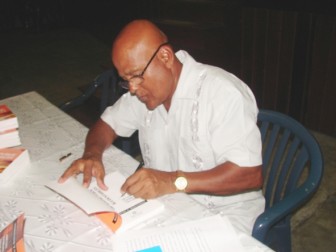-Anand Goolsarran says at book launching
Acting appointments are likely to lead to the performance of senior public servants being compromised as they feel beholden to those in authority.
A case in point is that of Auditor General Deodat Sharma who has been acting in his capacity for the last seven years, says former Auditor General Anand Goolsarran. He was at the time speaking at the official launch of his book ‘Improving Public Accountability in Guyana’ in collaboration with Transparency Institute of Guyana Inc which was held on Tuesday evening in the Marian Academy Auditorium.
“Any constitutional office you ought not to have prolonged acting persons … why hasn’t it (appointments) been done? …We have the acting Chief Justice, we have the acting … Chancellor…once people are acting they depend on the executive for their continued acting appointment …they wait on the executive hoping they will be substantively appointed… they cannot rock the boat and that’s the picture” said Goolsarran.

He lamented as he reflected on his tenure during the Desmond Hoyte Administra-tion 1985-1992 when he said he received no support but positions had to be substantively held. “If I had to leave the country for one day my deputy had to be sworn in because there must be a substantive auditor general. It is totally undesirable to have someone acting”, he said.
“I received no support from the then government and it was a bit understandable because it was close to election and to have a process like that restarted, it would have been obvious that the approach would have been critical… I wasn’t able to win the support of the Hoyte administration, I was not,” he said. “We virtually had to blaze the trail alone …to prepare the accounts because the Ministry of Finance was not prepared to move, there was a lot of resistance from taking draft reports, bringing them over to the audit office. At that time we had just started computerization and we put everything in the computer and we printed out the statements and took them back and got them to sign and that’s how we restarted the process”, he added.
He gave credit to the People’s Progressive Party/ Civic for having a yearly auditor general’s report as compared to none during the PNC era. “It was a huge effort over the years to start the process and today we have annual financial reporting and we have auditing of those accounts and they are laid in parliament,” he said.
Using an anecdotal real life experience he told of making a case for the reports to be done after the 1992 general elections to Head of the Presidential Secretariat, Dr. Roger Luncheon. He said that he advocated that the process begin but this was met with resistance from the then Accountant General who said that there would be gaps. Said Goolsarran “I met with Dr. Luncheon to present my case…he called the Accountant General and we had a discussion. He asked ‘You listened to the proposal by Anand what do you think?’ He (the Accountant General) said there would be lapses in accountability…Dr Luncheon asked what percentage of accuracy would be achieved and he said between sixty to seventy percent. Dr. Luncheon asked him ’Wouldn’t sixty to seventy percent level accuracy be better than no financial reporting?’ and he (the Accountant General) was taken aback. The instructions were given to let us restart the process”.
With Speaker of the National Assembly, Raphael Trotman and some parliamentarians present he used the opportunity to recommend that the September 30th deadline for the Auditor General’s report not be rigid and that there should be room for flexibility so as not to compromise the quality. “It’s no point trying to meet the deadline at the expense of quality” he argued.
President of the George-town Chamber of Commerce and Industry and Vice Chairman of the Private Sector Commission, Clinton Urling, who was also among the attendees, feels that every parliamentarian and member of the private sector should read the book to be edified about public accountability. “I think this is a useful book for all public officials especially and specifically members of the National Assembly and the private sector …it is necessary reading for all of them. All groups must know that they have a responsibility to know what is taking place in the public accounts system and what are some of the requirements of it”, he said.
The book gives an in depth analysis through the use of data charts and tables of the role of the Public Accounts Committee of Parliament, the Integrity Commission, the Public Procurement Commis-sion and Procurement Act 2003 among others. It is on sale at Austin’s Bookstore.





